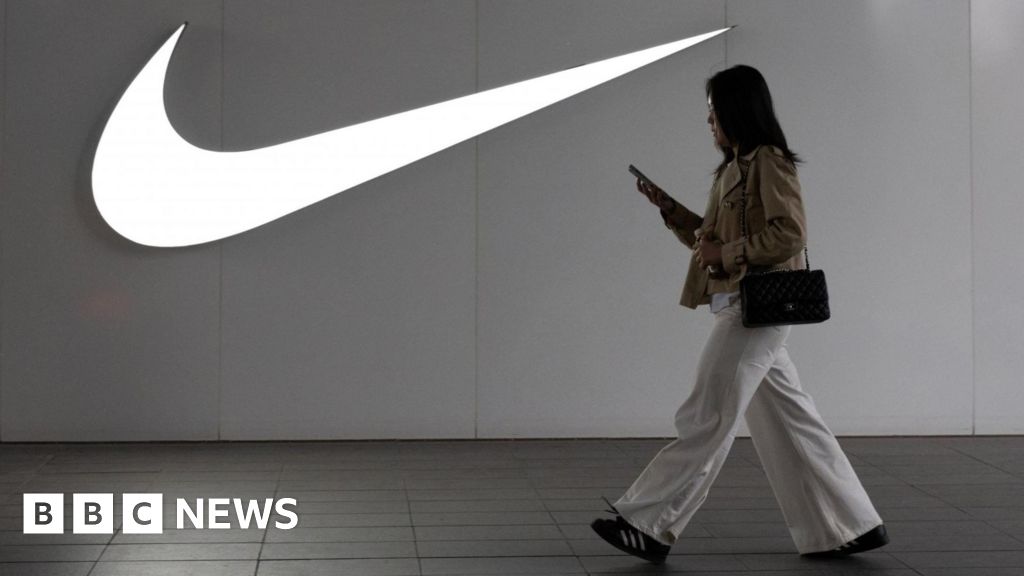Nike says US President Donald Trump's tariffs on key trading partners could add around $1bn (£730m) to it costs this year. Company executives also said the the sportwear giant would cut its reliance on producing goods in China to ease the impact of US trade policies. Last month,Nike said it would raise prices on some trainers and clothing in the US from early June, weeks after rival Adidas warned it would have to hike the cost of goods due to tariffs. Nike's shares jumped by more than 10% in extended trading after the firm forecast a smaller drop in first quarter revenue than many analysts had expected. The company's earnings for the last three months also topped estimates, despite being its worst quarterly figures for more than three years. Nike announced fourth quarter revenue of $11.1bn - the lowest since the third quarter of 2022. Chief financial officer Matthew Friend said Nike would move some production from China, which was hit with the biggest tariff increases, to other countries in response to Trump's tariffs. China currently manufacturers 16% of Nike footwear that ends up in the US. Mr Friend said that figure would be cut to a "high single-digit percentage range" by the end of May 2026. Trump announced sweeping "Liberation Day" tariffs on most goods from countries around the world on 2 April. In April, hesuspended most of those tariffsto allow for talks with the affected countries, with one top adviser promising "90 deals in 90 days". The move dropped tariffs to 10%, instead of the far higher rates that goods from many trading partners faced. The White House is now facing growing questions about what the president is planning to do about tariffs, as the 90-day pause is due to expire on 9 July. In remarks at the White House on Thursday, Trump maintained that talks were going well, pointing to an agreement reached with China and saying there was another "coming up with India, maybe". But he also warned "We're not going to make deals with everybody". "Some we're just going to send them a letter, say thank you very much. You're going to pay 25, 35, 45%. That's the easy way to do it," he said. "My people don't want to do it that way. They want to do some of it, but they want to make more deals than I would do," he added. Commerce Secretary Howard Lutnick later told Bloomberg that the agreement with China formalised terms laid out in trade talks, which included a commitment from Beijing to deliver rare earths minerals used in everything from planes to wind turbines. Treasury Secretary Scott Bessent has previously raised the possibility that Trump could extend the deadline, depending on how talks are going. On Thursday, White House spokesperson Karoline Leavitt said both that the deadline was "not critical" and that Trump was prepared to present countries with "deals" that would set new tariff rates. The US and China announced an agreement earlier this month aimed at ensuring US supply to critical magnets and rare earths, after concerns about access had risked re-igniting trade tensions between the two economic superpowers. At the White House on Thursday, Trump said he had "signed" a deal with China without giving further details. "The administration and China agreed to an additional understanding for a framework to implement the Geneva agreement," a White House official said later. Trade between the two sides was nearly shut down after Trump raised tariffs and China hit back in a barrage of tariffs in April that had nearly shut down trade between the two countries. The US and China subsequently agreed to reduce - but not eliminate - those tariffs.
Nike says Trump tariffs could raise its costs by $1bn
TruthLens AI Suggested Headline:
"Nike Projects $1 Billion Increase in Costs Due to Trump Tariffs"
TruthLens AI Summary
Nike has recently announced that the tariffs imposed by US President Donald Trump on key trading partners could potentially increase its costs by approximately $1 billion this year. In response to these trade policies, company executives indicated that Nike plans to reduce its dependence on manufacturing goods in China, where the most significant tariff increases have been applied. As part of its strategy to mitigate the financial impact of these tariffs, Nike has already announced a price increase on certain footwear and apparel in the US, set to take effect in early June. This decision follows a similar warning from competitor Adidas, which also indicated that it would need to raise prices due to the tariffs. Despite reporting its lowest quarterly revenue in over three years, Nike's shares surged by more than 10% in after-hours trading, buoyed by a forecast that suggested a smaller-than-expected decline in first-quarter revenue compared to analysts' predictions.
The context of these tariff changes stems from Trump's earlier announcement of widespread tariffs, dubbed "Liberation Day," on numerous goods from various countries. Although Trump later suspended most of these tariffs to facilitate negotiations with affected nations, the uncertainty surrounding the expiration of this 90-day pause has raised questions about future tariff rates. Trump has expressed optimism about ongoing negotiations, particularly highlighting an agreement with China and potential discussions with India. However, he has also indicated a willingness to impose higher tariffs on some countries if negotiations do not yield satisfactory results. The administration's recent agreements with China regarding critical minerals have further complicated the trade landscape, as the US and China had previously engaged in escalating tariff disputes that severely disrupted trade. As the deadline for tariff negotiations approaches, the White House is considering its options and preparing to present new tariff deals based on the outcome of these discussions.
TruthLens AI Analysis
You need to be a member to generate the AI analysis for this article.
Log In to Generate AnalysisNot a member yet? Register for free.
